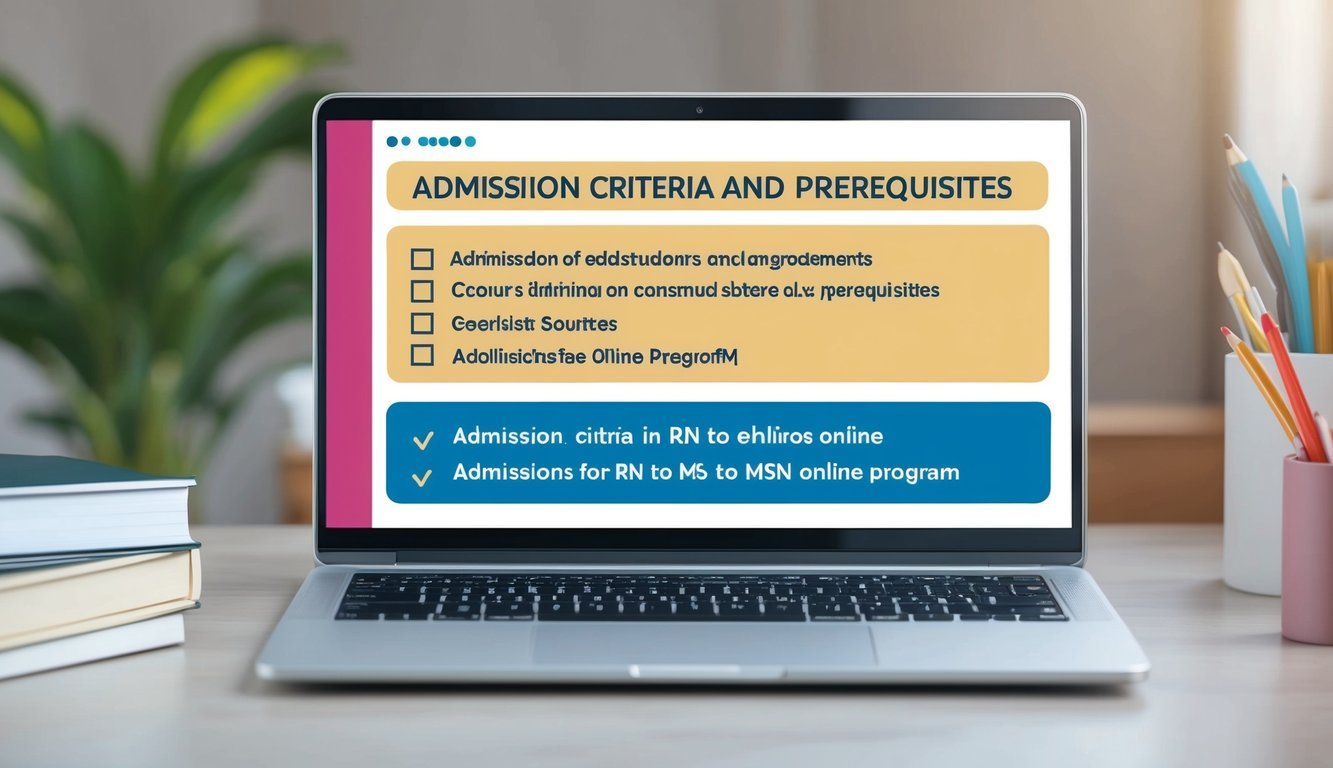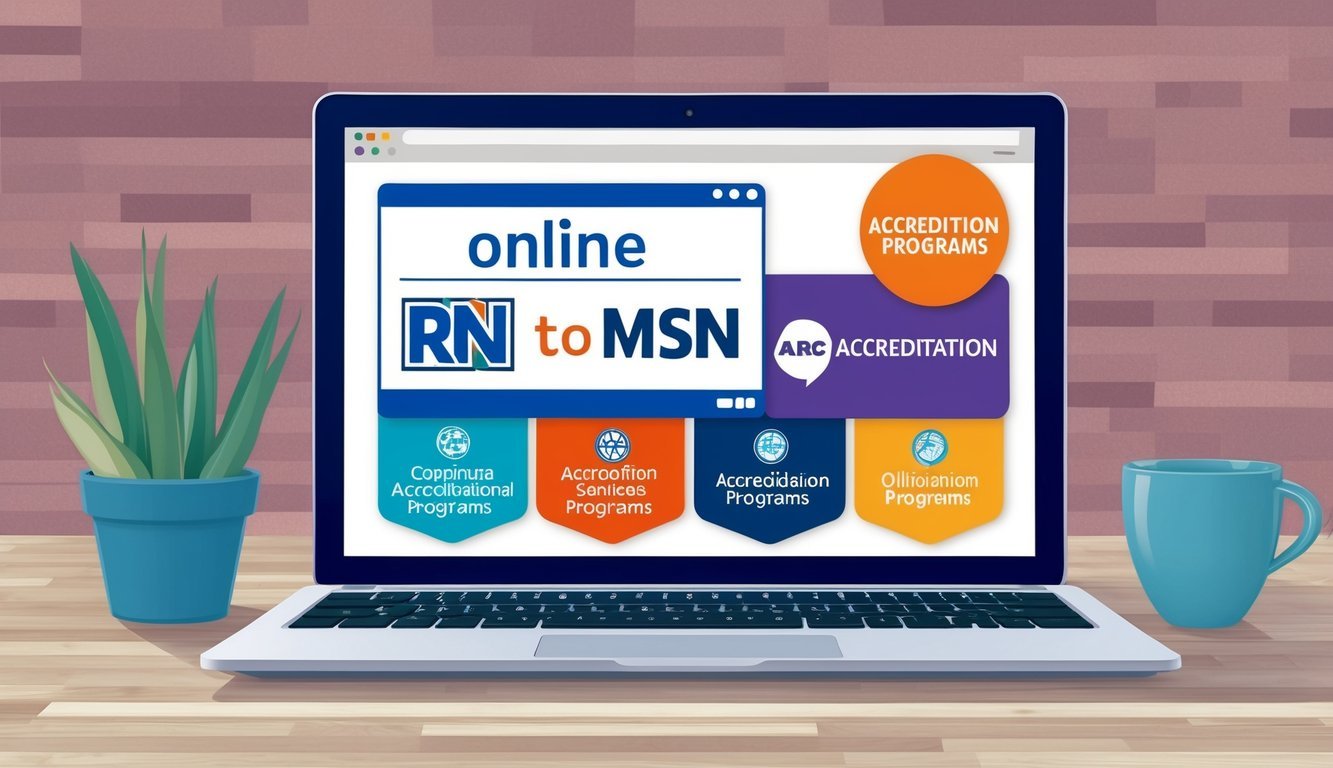For registered nurses seeking to advance their careers, enrolling in the shortest RN to MSN online program can be a strategic decision. These programs typically allow you to earn your Master of Science in Nursing in as little as 16 to 24 months.
This enables you to enhance your skills and expand your professional opportunities while balancing work and personal commitments.
With the growing demand for advanced nursing roles, completing your MSN can open doors to specialized positions, such as nurse practitioner or nurse educator.
This path not only equips you with advanced clinical knowledge but also helps you meet the requirements for higher licensure, setting you apart in a competitive job market.
Many institutions now offer flexible online formats designed specifically for busy professionals like you.
By choosing the right program, you can efficiently transition from your RN licensure to a Master’s degree, making your journey towards career advancement both accessible and rewarding.
For more detailed comparisons of programs, check out resources that explore the shortest RN to MSN online programs.
Overview of RN to MSN Online Programs
RN to MSN online programs offer a streamlined route for registered nurses to advance their education and career.
These programs cater to various nursing backgrounds and help you transition into advanced practice roles.
Understanding the Pathway
The pathway from RN to MSN often involves a few key stages.
For those starting with an Associate Degree in Nursing (ADN), you can enroll in RN to MSN programs that may not require a Bachelor of Science in Nursing (BSN).
This structure facilitates quicker progress through your education.
Typically, you will complete core nursing courses alongside specialized MSN-level courses.
Programs often range from 16 to 24 months based on your enrollment status and chosen specialization, such as Nurse Educator or Nurse Leader.
Some accelerated RN to MSN options permit you to earn your degree in less time, making them ideal for busy professionals.
Benefits of Online Education
Choosing an online format for your RN to MSN program provides several advantages.
Flexibility is among the most significant benefits, allowing you to study at your pace and balance work commitments.
Many accredited programs offer fully online coursework, often accompanied by practical experiences at local facilities.
Online programs also commonly incorporate modern technologies, enriching your learning experience through interactive modules and virtual simulations.
Furthermore, the accelerated format helps you complete your degree faster than traditional on-campus methods.
In terms of career opportunities, obtaining an MSN qualifies you for roles as an Advanced Practice Registered Nurse (APRN).
The investment in your education can lead to higher earning potential and greater job satisfaction in the long run.
Key Components of RN to MSN Curriculum
In an RN to MSN program, you will encounter a blend of fundamental nursing courses and specialized training options.
These components are essential for developing your expertise in various areas of nursing and healthcare management.
Core Nursing Courses
Core nursing courses form the backbone of your RN to MSN curriculum.
These courses typically include key subjects such as:
- Advanced Nursing Theory: Focuses on the principles that guide nursing practice.
- Research Methods: Teaches you how to conduct and evaluate nursing-related research.
- Healthcare Policy: Explores the impact of policy on health care delivery and nursing roles.
In addition to theoretical knowledge, clinical training is often integrated into core courses to ensure you apply what you learn in real-world settings.
Simulation labs and healthcare simulations may be utilized to enhance your hands-on experience.
This blend of theory and practice prepares you for advanced roles in nursing education, administration, or leadership.
Specialization Options
Specialization options let you tailor your education to your career goals.
Common specialties in RN to MSN programs include:
- Nursing Administration: Focuses on management skills necessary for overseeing nursing teams and healthcare facilities.
- Nursing Leadership: Develops your ability to guide nursing staff and implement change within healthcare organizations.
- Nurse Practitioner Specialties: Allows you to specialize in areas like family practice, pediatrics, or geriatrics, providing advanced clinical care.
You may also find courses in nursing informatics, which emphasize the use of technology in healthcare to improve patient care and outcomes.
These specializations prepare you for diverse roles in an evolving healthcare landscape.
More information on specialization options can be found at Nursing Degree Programs.
Admission Criteria and Prerequisites

Understanding the specific admission criteria and prerequisites for RN to MSN online programs is crucial.
These requirements can significantly influence your eligibility and preparation for advanced nursing education.
Required Academic Background
To qualify for an RN to MSN program, having the proper academic credentials is essential.
Most programs require you to possess an associate degree in nursing (ADN) or a non-nursing bachelor’s degree.
If you hold an ADN, you may still need to complete certain bridge courses to transition into the MSN program.
For those with a non-nursing bachelor’s degree, you’ll typically need to complete pre-requisite nursing courses or an accelerated program offering core nursing fundamentals.
Many colleges also specify a minimum GPA requirement, often around 3.0 or higher.
Having transcripts from prior institutions ready for submission is also necessary.
Licensure and Clinical Experience
Possessing an active, unencumbered RN license is a critical requirement for entry into any RN to MSN program.
This ensures you have the foundational nursing knowledge and skills needed for advanced practice.
In addition to your license, many programs expect applicants to have relevant clinical experience, usually around a year of practice.
This experience not only strengthens your application but also enhances your understanding of advanced nursing roles.
During the application process, be prepared to provide details about your nursing experience and any certifications you hold, as these may also be evaluated.
Tuition, Financing, and Scholarships
Understanding the costs associated with RN to MSN online programs is crucial for your planning.
You should also explore various financing options and scholarship opportunities to help manage these expenses effectively.
Program Costs
Tuition costs for RN to MSN programs vary widely based on the institution and program specifics.
On average, you can expect to pay between $15,000 and $40,000 for the entire program.
Each MSN degree typically requires around 30 to 60 credits, depending on the specialization.
Here’s a breakdown of potential costs:
| Program Type | Average Tuition Cost | Average Credits Required |
|---|---|---|
| MSN in Nursing Education | $20,000 – $30,000 | 36 – 48 |
| MSN in Nurse Leadership | $25,000 – $35,000 | 30 – 42 |
| RN to MSN Combined | $30,000 – $40,000 | 60 – 75 |
Keep in mind that additional fees for textbooks, materials, and clinical experiences may apply.
Researching various programs can help you find the best fit for your budget and career goals.
Financial Aid Options
To alleviate tuition costs, you can explore several financial aid options.
Most institutions offer scholarships specifically for nursing students.
Here are common sources of financial assistance:
- Federal Grants: You may be eligible for Pell Grants or other federally funded programs.
- Private Scholarships: Many organizations offer scholarships targeting nursing students. Sites like Fastweb and Nursing.org can help you find applicable scholarships.
- Loan Programs: Federal student loans generally offer lower interest rates than private loans. Consider programs like the Direct Unsubsidized Loan.
Make sure to fill out the FAFSA to assess your eligibility for federal financial aid.
Taking advantage of these opportunities can significantly ease your financial burden while pursuing your MSN degree.
Accreditation and Choosing a Program

Choosing an online RN to MSN program involves careful consideration of accreditation and the right university.
Accreditation ensures that your educational experience meets established standards, which affects your degree’s value and your future employment opportunities.
Importance of Accreditation
Accreditation is crucial in determining the quality of nursing programs.
It demonstrates that a program meets specific educational standards set by accrediting bodies.
Two major accrediting organizations are the Commission on Collegiate Nursing Education (CCNE) and the Accreditation Commission for Education in Nursing (ACEN).
Enrolling in an accredited program is essential for the following reasons:
- Financial Aid: Most federal financial aid requires enrollment in an accredited institution.
- Employment Opportunities: Hospitals and healthcare organizations often prefer graduates from accredited programs.
- Transfer Credits: If you decide to transfer, accredited programs typically allow easier credit transfers.
Checking the program’s accreditation status helps ensure your investment in education is worthwhile.
Selecting the Right University
When selecting a university for your RN to MSN program, consider several factors:
-
Reputation: Research the school’s standing in nursing education. Universities like Chamberlain University and Herzing University are well-regarded for their nursing programs.
-
Flexibility: Look for programs that offer flexible online formats, such as Western Governors University and Capella University.
-
Support Services: Check if they provide resources like academic advising and career counseling.
You should also review curriculum specifics, length of the program, and clinical placement opportunities.
Institutions like DePaul University and East Tennessee State University offer options tailored to working professionals.
Take the time to gather information and evaluate different universities based on these important criteria to ensure you make the best choice for your nursing career.

